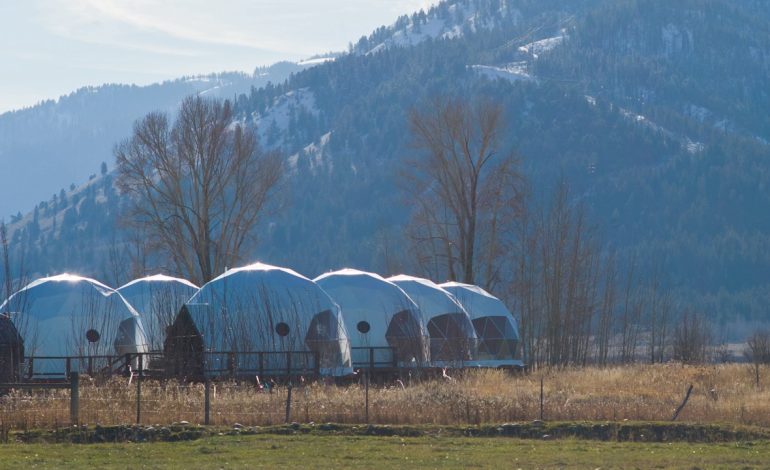The Wyoming Supreme Court has ruled that residents seeking to challenge development on state trust land in Teton County cannot directly participate in a lawsuit between the State of Wyoming and Teton County, Wyo File reports.
The court determined that the group Citizens for the Responsible Use of State Lands (CRUSL) did not meet the legal criteria to intervene in the case and that the county is adequately representing the group’s interests.
The case centers on a dispute over the county’s authority to enforce local building and safety codes on state-managed land, including a glamping hotel development near Teton Village. The Wyoming Board of Land Commissioners sued Teton County, arguing that the county has no jurisdiction over the state-owned land. CRUSL, a group of local residents and landowners, sought to join the legal fight, arguing that their interests were distinct from those of the county.
However, the court ruled that CRUSL does not have a “significant protectable interest” in the case and that its members’ rights would be sufficiently defended by Teton County.
“CRUSL failed to meet its burden… CRUSL does not have a significant protectable interest in the underlying litigation [and] Teton County adequately represents CRUSL’s interest,” the justices wrote in an 11-page opinion.
The decision upholds an earlier ruling by the Laramie County District Court that also denied CRUSL’s request to intervene.
CRUSL had argued that it should have a direct role in the case because the outcome could affect future development on state trust lands across Wyoming. The group said it wanted to ensure that local governments maintain some oversight of state-owned lands within their borders.
CRUSL’s attorney, Bill Schwartz, expressed disappointment with the ruling, saying it limits the voices of residents who may be directly affected by future development.
“We believe the Wyoming judiciary would have benefited from hearing from at least some of those impacted citizens before deciding the weighty issue before it… The outcome of this case will impact thousands of Wyoming citizens who may find themselves one day living next to an undesirable business over which their local government may have no power to regulate,” Schwartz said.
CRUSL and other organizations, including the Wyoming County Commissioners Association, were allowed to file amicus briefs — written statements supporting Teton County’s arguments. However, CRUSL had hoped for a more active role in court proceedings.
At the heart of the case is the issue of whether Teton County has the power to enforce local zoning, building, and safety codes on state trust lands. The county and CRUSL want local regulations to apply to developments like the proposed glamping hotel near Teton Village, which includes canvas-covered lodging, storage sheds, and other structures.
The state argues that Wyoming’s sovereign immunity shields it from county oversight. The Supreme Court emphasized that CRUSL’s interest in the case is dependent on whether Teton County can prove it has jurisdiction over the land.
“Any interest of those [CRUSL] members is contingent upon whether or not the Teton County land development regulations are even enforceable on the [state] Parcel because of the State’s sovereign immunity,” the court wrote.
This unresolved issue of jurisdiction remains the central question in the broader legal battle between the state and the county.
CRUSL had also claimed that Teton County might not adequately protect local residents’ interests because it had requested a variance to use part of the same state trust land for its own purposes. The county sought to store flood-control materials like rocks on the land, which CRUSL argued was a “non-conforming use” under Teton County’s own zoning regulations.
But the Supreme Court disagreed, noting that the county followed its own rules when seeking a variance for the temporary stockpiling of materials.
“The record indicates Teton County followed its own rules and regulations when seeking a variance on state trust lands… It further indicates Teton County fully intends to ensure all its rules and regulations are enforceable on all state trust land in Teton County,” the court wrote.
While CRUSL will not be allowed to formally intervene in the lawsuit, its amicus brief will still be considered by the court. The larger legal question of whether Wyoming’s sovereign immunity prevents local authorities from enforcing their regulations on state trust land has yet to be resolved.
Schwartz, CRUSL’s attorney, said he remains optimistic that the court will ultimately rule in favor of local control.
“We are very disappointed CRUSL was denied this opportunity and that the only voice heard in opposition to the Land Board will be that of the Teton County Commission… That said, we are grateful the Supreme Court has accepted the amicus briefs filed by CRUSL and other organizations, including the Wyoming County Commission Association, and are hopeful for a favorable decision on the merits,” Schwartz said.









